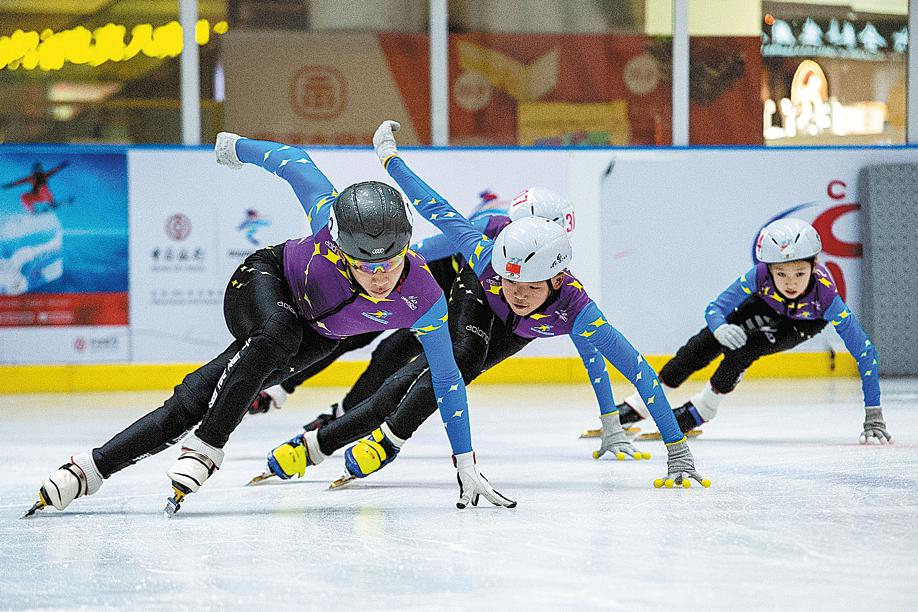
Ma Zhao takes the lead in a training session in Yinchuan, Ningxia Hui autonomous region.[Photo/Xinhua]
When people gradually left the brightly lit shopping mall on a summer night, the ice rink began to embrace 64-year-old skating coach Liu Wei and his troupe of young students.
"After people leave the mall, the rent of this ice rink is lower. This is why we always train until midnight," says Liu, whose speed on ice belies his graying temples.
The ice rink for commercial purpose is located in Yinchuan, Ningxia Hui autonomous region, a drought-stricken and comparatively underdeveloped part of the country. There are few ice rinks in the city, but Liu dreams to cultivate a champion team for the region.
"In terms of skating, balance and strength are the key," Liu says.
The team, constituting of over 20 children, is the best in Ningxia, despite an average age of 14. Apart from training on ice, Liu also takes children to open spaces to practice roller-skating and running.
"It's my daughter's honor to have Liu as her coach. She has made amazing progress over the last six months," says Wang Chao, her eyes following her daughter as she skates by.
Born in Northeast China's Heilongjiang province, where ice and snow sports are popular due to the long winters, Liu has been skating since childhood, and his father was a professional skating coach. However, ice and snow sports did not offer much reward as a profession back then, and Liu gave up being a professional athlete, turning to another field of work.
In the beginning of the 1990s, Liu left his hometown for Yinchuan for better work opportunities, but still kept up his interest. Ningxia had no ice rink then, so Liu skated on a frozen lake in the park, and his performance attracted many fans. People's enthusiasm rekindled Liu's passion for the sport, and he decided to bring skating to the city.
In 1993, he established the Association of Skating and Roller-skating of Ningxia, taking in about 500 members. But his determination to establish a professional skating team was triggered by a national-level roller-skating competition held in Yinchuan almost two decades ago.

Skating coach Liu Wei (left) instructs one of his team members on the ice rink.[Photo/Xinhua]
"I went to see how the Yinchuan skaters performed, only to find they just finished one-fifth of the competition," Liu recalls. "So I decided to resign and become a coach, cultivating skaters for this city."
Liu has coached around 3,000 children, but most of them left his tutelage after entering middle school. The eldest member of his team is 19-year-old Ma Zhao, who has been following him for 10 years and won a gold medal at the 2014 Youth Olympic Games in Nanjing, Jiangsu province.
"Ma used to have a competitor in the team. It's a pity that the other boy left. The two boys could make progress together if he was still here," Liu says.
Parents have been supporting their children to learn skating, thanks to the country's commitment to engage more than 300 million people in winter sports. Liu's team is now sponsored by the Ningxia Sports Bureau.
As a coach, Liu keeps learning new skills for short-track speedskating by watching elite competitions on TV. "If I don't learn, how is it possible for my children to step on the stage of the Olympic Games?"
Liu says he feels his age. The pain in his muscles and joints that used to be cured by a good night's sleep now keeps torturing him. He is seizing both the day and night to cultivate his team and successor.
He has also been invited to teach at Ningxia Vocational College of Physical Education. Students from the once poverty-stricken Xihaigu region used to have no idea of skating, but many of them have changed their majors to learn to skate with Liu, thanks to the country's poverty-alleviation campaign and emphasis on ice and snow sports.
"I believe the place will have a lot of skating talent in the near future," says Liu. "And this is my dream."

